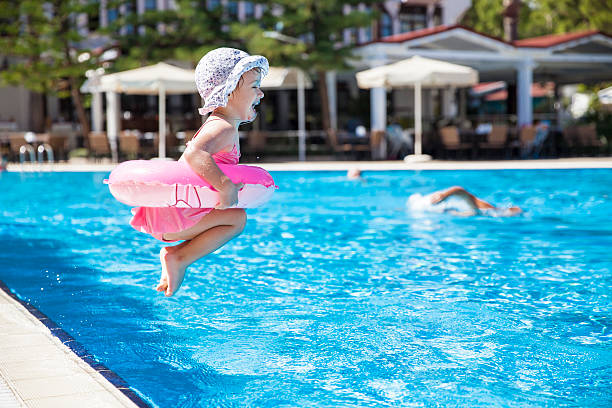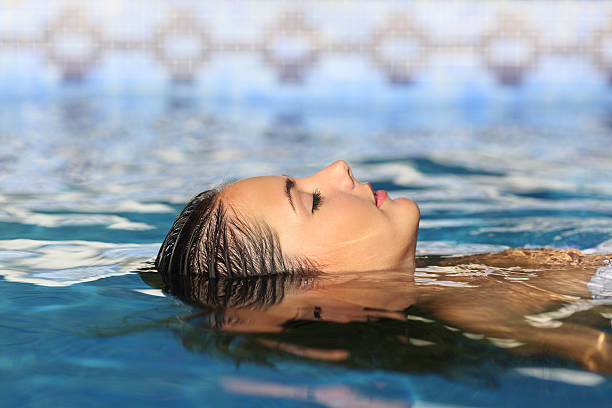Bromine vs. Chlorine: Choosing the Right Sanitizer for Your Pool
When it comes to maintaining a sparkling and safe swimming pool, selecting the appropriate sanitizer is paramount. Two popular choices among pool owners are bromine and chlorine. Understanding the nuances of each option can help you make an informed decision that best suits your needs. Let’s dive into the differences between bromine and chlorine to help you choose the right sanitizer for your pool.

What is Bromine?
Bromine is a chemical element often used as a sanitizer in pools and spas. Unlike chlorine, which is a gas, bromine is typically available in tablet or granular form. It works effectively at a wider pH range than chlorine, making it a suitable option for pools with fluctuating pH levels. Bromine also tends to be less harsh on the skin and eyes compared to chlorine, making it a preferred choice for individuals with sensitive skin.
On the other hand, Chlorine…
Chlorine is the most common sanitizer used in swimming pools worldwide. It is available in various forms, including tablets, granules, and liquid. Chlorine effectively kills bacteria, viruses, and algae, keeping the pool water clean and safe for swimmers. While chlorine may cause skin and eye irritation in some individuals, proper maintenance and monitoring of chlorine levels can mitigate these effects.

Comparing Effectiveness and Efficiency
Both bromine and chlorine are effective sanitizers when used correctly. However, they differ in terms of efficiency and effectiveness under certain conditions. Bromine is more stable than chlorine at higher temperatures, making it an ideal choice for hot tubs and spas where water temperatures are elevated. Chlorine, on the other hand, works efficiently in a wider range of pH levels and is generally more cost-effective for larger pools.
Safety Considerations
Safety is a crucial factor to consider when choosing a pool sanitizer. While both bromine and chlorine are generally safe when used according to instructions, it’s essential to handle these chemicals with care. Avoid mixing them with other pool chemicals to prevent potentially hazardous reactions. Additionally, ensure proper ventilation when adding chemicals to the pool water to avoid inhaling harmful fumes.

Environmental Impact
In recent years, there has been growing concern about the environmental impact of pool sanitizers. Chlorine has been associated with the formation of harmful by-products, such as chloramines and trihalomethanes, which can be detrimental to both human health and the environment. Bromine, while less prone to forming these harmful by-products, still requires proper disposal to minimise its environmental impact.
Maintenance and Cost
Another factor to consider is the ongoing maintenance and cost associated with each sanitizer. Chlorine is generally more affordable and readily available than bromine, making it a cost-effective option for many pool owners. However, bromine may require less frequent monitoring and adjustment, particularly in hot tubs and spas, where it remains stable at higher temperatures.

Personal Preference and Convenience
Ultimately, the choice between bromine and chlorine may come down to personal preference and convenience. Some individuals may prefer the milder scent and gentler feel of bromine-treated water, while others may opt for the familiarity and accessibility of chlorine. Consider factors such as ease of use, availability of products, and individual sensitivities when making your decision.
Conclusion
In the debate of bromine vs. chlorine, there is no one-size-fits-all answer. Each sanitizer has its advantages and disadvantages, and the right choice depends on your specific circumstances and preferences. Whether you prioritize stability, effectiveness, cost, or environmental impact, weighing the pros and cons of each option can help you make an informed decision. Ultimately, maintaining a clean and safe swimming pool requires regular monitoring, proper sanitation, and responsible chemical handling, regardless of the sanitizer you choose.


Can you be more specific about the content of your article? After reading it, I still have some doubts. Hope you can help me.
Thank you, your article surprised me, there is such an excellent point of view. Thank you for sharing, I learned a lot.
Can you be more specific about the content of your article? After reading it, I still have some doubts. Hope you can help me.
Thank you, your article surprised me, there is such an excellent point of view. Thank you for sharing, I learned a lot.
Your article helped me a lot, is there any more related content? Thanks!
Your point of view caught my eye and was very interesting. Thanks. I have a question for you.
Your article helped me a lot, is there any more related content? Thanks!
Your article helped me a lot, is there any more related content? Thanks!
Your point of view caught my eye and was very interesting. Thanks. I have a question for you. https://www.gate.com/share/XwNAUwgM
Thanks for sharing. I read many of your blog posts, cool, your blog is very good.
I don’t think the title of your article matches the content lol. Just kidding, mainly because I had some doubts after reading the article.
Your point of view caught my eye and was very interesting. Thanks. I have a question for you.
Thank you for your sharing. I am worried that I lack creative ideas. It is your article that makes me full of hope. Thank you. But, I have a question, can you help me?
Thank you for your sharing. I am worried that I lack creative ideas. It is your article that makes me full of hope. Thank you. But, I have a question, can you help me?
Thank you for your sharing. I am worried that I lack creative ideas. It is your article that makes me full of hope. Thank you. But, I have a question, can you help me?
Thanks for sharing. I read many of your blog posts, cool, your blog is very good.
Thank you for your sharing. I am worried that I lack creative ideas. It is your article that makes me full of hope. Thank you. But, I have a question, can you help me?
Can you be more specific about the content of your article? After reading it, I still have some doubts. Hope you can help me.
Your article helped me a lot, is there any more related content? Thanks! https://www.binance.info/zh-TC/register?ref=DCKLL1YD
Your article helped me a lot, is there any more related content? Thanks! https://accounts.binance.com/lv/register?ref=SMUBFN5I
Thanks for sharing. I read many of your blog posts, cool, your blog is very good. https://accounts.binance.info/es-AR/register-person?ref=UT2YTZSU
Thanks for sharing. I read many of your blog posts, cool, your blog is very good.
Thanks for sharing. I read many of your blog posts, cool, your blog is very good. https://www.binance.com/register?ref=IHJUI7TF
Bong365bong88 is the place to be for serious sports betting. They’ve got all the markets you could ask for, and their live betting platform is top-notch. If you know your sports, you can definitely make some money here. Check it out: bong365bong88
Your point of view caught my eye and was very interesting. Thanks. I have a question for you.
https://www.fvhospital.com/
Your point of view caught my eye and was very interesting. Thanks. I have a question for you.
777daulat is awesome. I’ve been addicted to its games for quite some time now. I suggest you give it a try! Link right here: 777daulat
This demo is low-key sus in the best way—the new mechanics are wild! The music slaps too. Definitely gonna keep an eye on this one.
Just played Sprunki Phase 16 and it’s an absolute banger! The new music tracks slap so hard, I’ve been vibing to them all day. Whoever composed these deserves a raise!
Yo, this Sprunki update is an absolute banger! The new hyper-shifted phase 3 music slaps so hard, I’ve been vibing to it for hours. The devs really outdid themselves this time.
Can you be more specific about the content of your article? After reading it, I still have some doubts. Hope you can help me. https://accounts.binance.com/id/register-person?ref=UM6SMJM3
Your article helped me a lot, is there any more related content? Thanks!
I don’t think the title of your article matches the content lol. Just kidding, mainly because I had some doubts after reading the article.